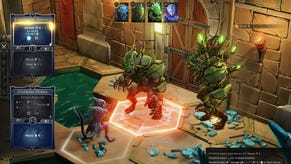Kixeye: "You can't do game design through data exclusively"
Will Harbin says creativity must be primary factor if companies are to innovate
Kixeye's Will Harbin has struck out at companies which he sees as relying too much on metric data and A/B testing, saying that creativity must be the primary motivator for innovative game development.
Speaking in an interview with GamesIndustry.biz today, Harbin said that, whilst data can prove to be a valuable tool for fine tuning, true creativity relies on instinct and passion.
"Data does not inform our road map," Harbin revealed. "I mean, it's only us as gamers that informs our road-map. What we do with data is we try to enhance the gaming experience. So for example when you have a lot of people who, let's say, complain in user forums about a new feature that you've launched, well the data might be saying that these guys are spending hours on this feature and it's causing them to come back to the game at an increased rate.
"That's a helpful experience that allows you to separate the vocal minority from the overall user base. If you just listen to the basic user feedback you might be making a severe error in game design decision by modifying something just because a few people are being vocal about slaying your decision.
"So we definitely do not design our games around data. We try to make improvements around data, and actually I had to give this speech to my team yesterday about being a little bit less reliant of A/B tests and data and trusting our intuition and instinct, since it seems to be more effective at moving the needle at a larger scale than doing a lot of micro data analysis.
"But it's very helpful when when you come to a decision where you have two or more options, it's good to allow data to influence some decisions. But you can't do game design through data exclusively. It can be an aid, it can be a tool, but if you're not creative, if you're not a thoughtful gamer or you're not super passionate about the space then you're not going to make a good game."
Harbin also sees the bigger social studios as being over-reliant on data feedback during the design phase, an approach which he says stifles creativity and leads to cycles of copy-catting. This metric-focused methodology, Harbin believes, is also at least partly responsible for the lack of Facebook and social titles which appeal to the traditional core audience.
"No, I think those guys rely too much on data and user studies," Harbin said in reference to Zynga, Playdom and their ilk.
"I think they're lacking in the game design and creativity department to be honest. Playdom is essentially just a Zynga rip off. They've tried to do some other things and now Gardens Of Time is relatively successful and Zynga's copied that, but I wouldn't say that's a super creative approach to gaming.
"The hidden object thing has been around for a while. It's not that interesting to a core gamer. Bottom line, they haven't done anything that I think would appeal to a core gamer, they've obviously found a little bit of success in the social gaming quadrant, but I think they rely much more heavily on data, user studies, etc. I don't think they have a team like ours that really thinks about the users and wants to make a compelling user experience."
To read more on Harbin's thoughts on design, the future of core social games and his plans for Kixeye, read the full interview here.








